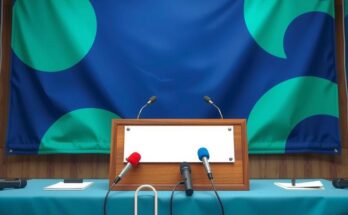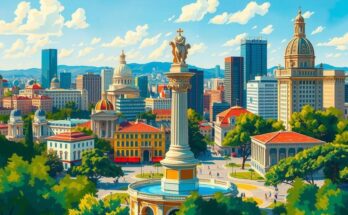Guinea-Bissau is in an institutional crisis as President Umaro Sissoco Embaló remains in power after his term expired on February 28, 2025. Domingos Simões Pereira demands his resignation, citing an expired parliament and the need for new elections within 90 days. The political situation is tense with threats against protests, as citizens face severe economic challenges and calls for constitutional respect intensify. Efforts from ECOWAS to mediate have thus far failed.
Umaro Sissoco Embaló’s presidential term officially ended on February 28, 2025, yet he continues to hold power. Domingos Simões Pereira, the leader of the African Party for the Independence of Guinea and Cape Verde (PAIGC), has called for Embaló’s immediate resignation, arguing that the president has obstructed Pereira’s efforts to form a government after winning the last parliamentary elections with a majority.
The parliament’s term has also lapsed, prompting Pereira to demand new presidential and parliamentary elections within 90 days, contrary to Embaló’s proposed date of November 30. Pereira asserts that the constitution mandates this process. He emphasizes the need to reconvene the parliament, which Embaló dissolved in December 2023, to appoint a National Election Commission and a new president for the Constitutional Court.
Embaló has governed Guinea-Bissau by decree for over a year, seemingly intent on sidelining Pereira, who faces corruption allegations. The president’s actions suggest a desire to maintain control for the foreseeable future, limiting other political entities’ influence. Once a member of PAIGC, Embaló is now affiliated with the MADEM G15, a breakaway faction.
Amidst the ongoing political turmoil, there is a growing sense of apathy among citizens facing an economic crisis. Nuno Nabiam, a former prime minister and leader of the second-largest opposition party, insists that protests will arise until constitutional order is reinstated. Conversely, Embaló has dismissed the opposition’s competence and recently visited Vladimir Putin in Moscow,
Embaló’s Interior Minister has threatened to swiftly curb any protests, and security officials have warned against disturbances. “The political situation in the country is very tense. The streets of Bissau are filled with soldiers, and the population is in panic and afraid of what might happen in the near future,” states Bubacar Turé, chairman of the Human Rights League.
Currently, large protests have not materialized, largely due to the substantial presence of security forces and the start of Ramadan. Demonstrations have primarily been reported among expatriate communities, such as those in Lisbon, Portugal. Protesters there demanded respect for the constitution, stating that Embaló’s mandate has expired.
Amid speculation regarding his actions while abroad, demonstrators question the implications of his visit to Russia and express concern over Embaló’s focus on international travel instead of national issues. “We have a president who doesn’t care about the problems in his own country because he is constantly abroad,” remarked Pedro Jandim from the PAIGC.
Efforts by ECOWAS to mediate the crisis have proven ineffective. A delegation led by Nigerian diplomat Bagudu Hirse accused Embaló of obstructing their mission before his visit to Russia, undermining hopes for a peaceful resolution. Lawyer Bubacar Turé noted the weakening influence of ECOWAS: “It cannot enforce its own rules.”
In conclusion, Guinea-Bissau is facing a profound institutional crisis with President Umaro Sissoco Embaló refusing to resign despite the official expiry of his term. Political calls for new elections are rising, led by Domingos Simões Pereira, as the opposition and civil society stress constitutional compliance. The government’s repression against protests exacerbates citizens’ discontent, while attempts at international mediation have faltered, reflecting a complex and unstable political landscape.
Original Source: www.dw.com




